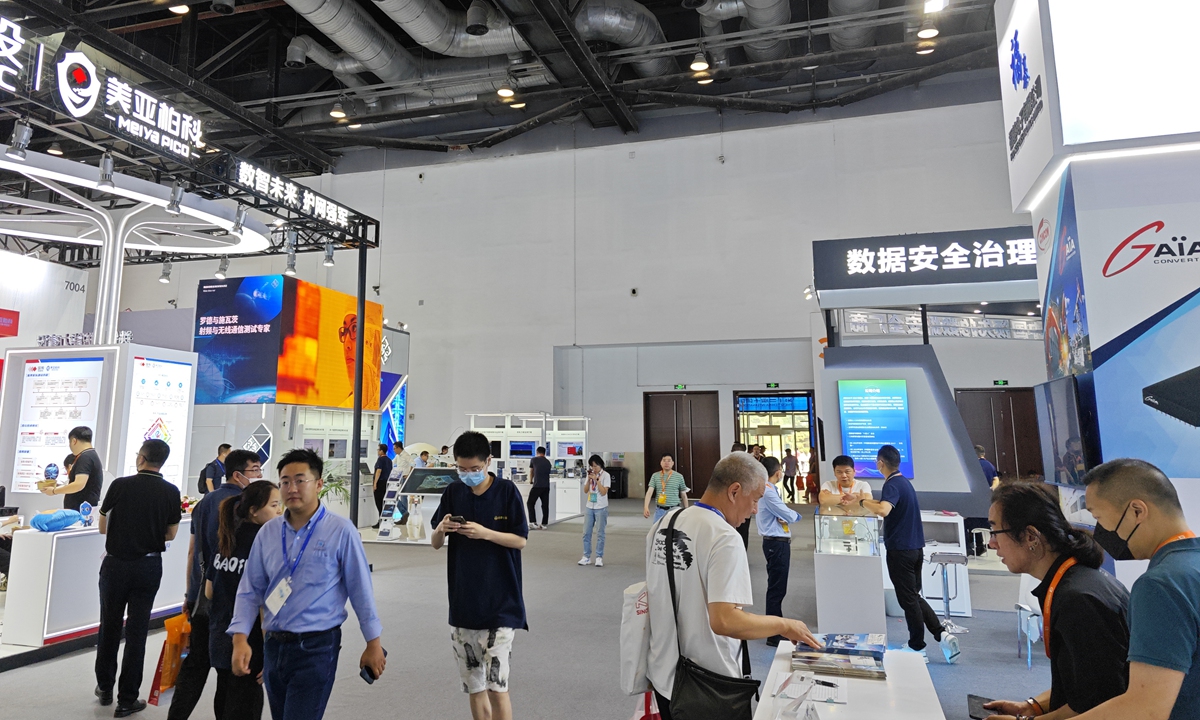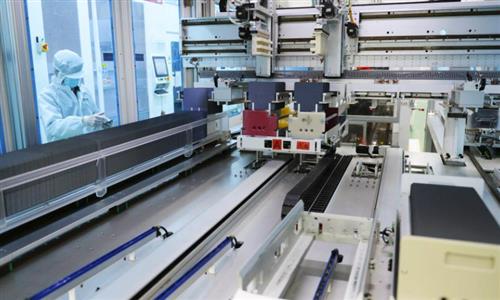Domestic and overseas tech firms defy decoupling trend to tap into thriving Chinese market for mutual benefit
Global firms embrace mutual benefits, defy US’ decoupling trend

Visitors attend the 12th China International Defense Electronics Exhibition in Beijing on June 26, 2023. Photo: Yin Yeping/GT
Chinese technology firms are showcasing their confidence in self-development and the pursuit of domestic substitutions at an electronics show in Beijing that opened on Monday, in a concerted effort to counter the impact of the decoupling moves led by the US.
With Chinese companies in both military and civil fields shifting toward localization and reducing dependence on foreign technology, foreign businesses are captivated by the allure of the thriving Chinese products and are defying the decoupling trend by actively exploring opportunities to tap into this dynamic landscape, the Global Times has learned.
At the 12th China International Defense Electronics Exhibition, which is being held from Monday to Wednesday, some 400 exhibitors, mostly domestic companies, have showcased their latest products and services ranging from telecommunications to database.
One conspicuous trend this year is the greater highlight on localization and self-dependence among domestic companies in response to the US decoupling moves, which have brought disruptions in business sectors and pushed local companies to seek alternatives.
Among the exhibitors, Beijing-based HSERA Technology Group Co, a domestic private company, has put more weight on domestic alternatives in a bid to gain a market edge and fend off external challenges.
At the expo, the Chinese company presented several kinds of boards that they had designed and produced, and some are already in the leading position in the market. At present, the main application scenarios include aerospace, nuclear industry and artificial intelligence.
Wang He, general manager of the company, told the Global Times on Monday that their domestic substitution effort is prompted by some external factors.
"Some international chips will be monopolized and domestic companies will not be allowed to access them… forcing Chinese companies to take the road of independent research and development," Wang said, noting that intensifying domestic production would be the trend for the next three to five years or even a longer time.
Beijing UCAS Technology Co is another pioneer in intensifying self-production and innovation in their focus areas.
The company has mainly started to work on key electronic systems in the field of aerospace and military industry, and participated in major scientific and technological projects such as BeiDou system and manned spaceflight, Li Linwei, brand manager of UCAS, told the Global Times.
In addition to aerospace and military industries, the company is also actively expanding the civilian market where there is a large-scale demand for storage products.
"Our hardware and software, including the underlying operating system, can all be independently developed and controlled, which is in line with the philosophy behind this company, which is to make domestic substitutions by ourselves and solve the bottlenecks of key components," Li said.
The company has worked on self-developed chips, and put emphasis on research and development in automotive-grade chips and aerospace-grade chips, the two major sectors that have huge potential.
Despite the US attempts to promote and intensify decoupling with China, visitors from a dozen countries are grabbing the potential for closer cooperation through meeting Chinese business partners and making deals.
Recognizing the potential for secure supply chains and growth, some foreign firms' representatives told the Global Times at the event how they are enticed by the prospect of collaborating with Chinese partners in a bid to navigate the evolving global tech landscape.
Grigorii Broido, lead engineer of NII STT, a research institute based in Smolensk, Russia, who came to China for the first time, was impressed by what Chinese companies can offer.
"This is my first time being here. I'm impressed by the advanced technology and products that Chinese companies can offer. It's a good replacement to some US technologies and provides us another good option," Broido said.
Alberto Massa, an industry insider from Italy, said that his company has been buying a lot of products ranging from chips to other electronic devices from China for many years even though he himself has never been to China before.
"It's good to be here and meet Chinese partners… the Chinese products are value-for-money and the technology is also good in terms of the world level," Massa told the Global Times.
In response to the intensifying US move to block Chinese technology companies and products, Massa said that such an attempt is unreasonable and does not make sense.
"It may bring disruption and concerns to many foreign companies," he said, adding that if the Chinese companies are no longer able to provide corresponding chips, then many foreign companies have to reinvent themselves from scratch and build more factories and probably with higher costs.
Yang Hui, the manager with a domestic technology company and an agent for the UK-based PICO Technology in China, has participated in the exhibition for many years in a row, and sees it as a good opportunity to tap into the booming Chinese market.
Yang's company has seen their business grow by 100 percent annually even during the COVID-19 epidemic in the past three years.
"Currently, the Chinese market accounts for around 30 percent of our global market, which is still fairly small, and there is a potential for further expansion," Yang said.
Talking about US' decoupling trend, Yang said that there has been no disruption to their business in China at the moment. Instead, he sees this as an opportunity. As US businesses pull out of the Chinese market, they can step in with more alternative products.



